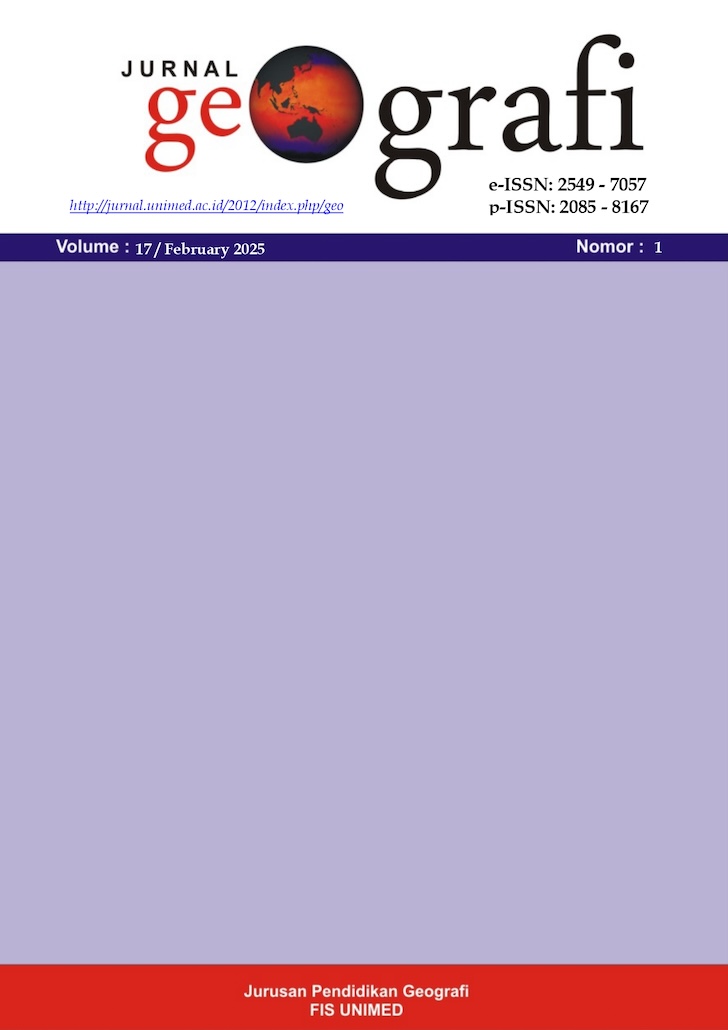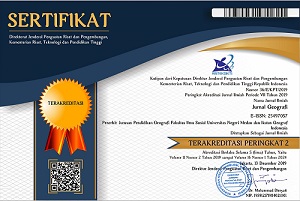Accelerating Young People's Disaster Literacy With Problem-Based Learning-Root Cause Analysis
English
DOI:
https://doi.org/10.24114/jg.v17i1.56569Abstract
Indonesians must have high literacy to know about the disasters around them. There needs to be a learning model to improve disaster literacy. One of the alternatives is the Problem-based learning model with Root Cause Analysis. This research is a quantitative type of pseudo experiment with a pretest-posttest control group design where the pretest-posttest results of the experimental class and control class are compared to determine the effectiveness of the treatment in the experimental class. There are no particular specifications regarding the characteristics of the class used in the study. Data analysis used a sample t-test supported by prerequisite tests such as homogeneity and normality tests. The PBLRCA model has a significant effect on students' disaster literacy skills. The results showed increased literacy skills at a t value of 5,787. Steps such as independent review, investigating the root of the problem, and implementing action plans that can make PBLRCA students read, explore and analyze situations in depth more than Lecturing Method. These activities make students' disaster literacy improve.References
Afrian, R., & Islami, Z. R. (2019). Peningkatan Potensi Mitigasi Bencana Dengan Penguatan Kemampuan Literasi Kebencanaan Pada Masyarakat Kota Langsa [Increasing Disaster Mitigation Potential by Strengthening Disaster Literacy Skills in Langsa City Community]. Jurnal Pendidikan Geografi, 24(2), 132“144. https://doi.org/10.17977/um017v24i22019p132
Al-Mamory, S. O., & Zhang, H. (2009). Intrusion Detection Alarms Reduction Using Root Cause Analysis and Clustering. Computer Communications, 32(2), 419“430. https://doi.org/10.1016/j.comcom.2008.11.012
Amaringga, N. G., Amin, M., & Irawati, M. H. (2021). The Effect Of Problem-Based Learning Module Containing Research Result To Improve Students' Scientific Literacy. AIP Conference Proceedings, 2330. https://doi.org/10.1063/5.0043529
Amin, S., Utaya, S., Bachri, S., Sumarmi, & Susilo, S. (2020). Effect Of Problem-Based Learning On Critical Thinking Skills And Environmental Attitude. Journal For The Education Of Gifted Young Scientists, 8(2), 743“755. https://doi.org/10.17478/jegys.650344
Andersen, B., & Fagerhaug, T. (2006). Root Cause Analysis (2nd ed.).
Anurogo, D. (2023, February 15). Diplomasi Literasi Bencana [Disaster literacy diplomacy]. Antara.
Asni, E., & Hamidy, M. Y. (2010). Manfaat dan Hambatan Problem-Based Learning (PBL) Menurut Perspektif Mahasiswa Baru di Fakultas Kedokteran Universitas Riau [Benefits and Barriers of Problem-Based Learning (PBL) According to the Perspective of New Students at the Faculty of Medicine, University of Riau].
Badan Nasional Penanggulangan Bencana (BNPB). (2020). Kejadian Bencana [Disaster Event 2020].
Badan Nasional Penanggulangan Bencana (BNPB). (2022). Kejadian bencana 2021 [Disaster Event 2021].
https://bnpb.go.id/infografis/kejadian-bencana-tahun-2021
Barrett, T. (2006). Understanding Problem-Based Learning. http://www.nuigalway.ie/celt/pblbook/
Bashith, A., & Amin, S. (2017). The Effect of Problem Based Learning on EFL Students' Critical Thinking Skill and Learning Outcome. Al-Ta Lim Journal, 24(2), 93“102. https://doi.org/10.15548/jt.v24i2.271
Brown, L. M., Haun, J. N., & Peterson, L. (2014a). A Proposed Disaster Literacy Model. Disaster Medicine and Public Health Preparedness, 8(3), 267“275. https://doi.org/10.1017/dmp.2014.43
Brown, L. M., Haun, J. N., & Peterson, L. (2014b). A Proposed Disaster Literacy Model. Disaster Medicine and Public Health Preparedness, 8(3), 267“275. https://doi.org/10.1017/dmp.2014.43
ÇallÅŸkan, C., & Ãœner, S. (2021). Disaster Literacy And Public Health: A Systematic Review And Integration of Definitions and Models. In Disaster Medicine and Public Health Preparedness (Vol. 15, Issue 4, pp. 518“527). Cambridge University Press. https://doi.org/10.1017/dmp.2020.100
Cerniglia-Lowensen, J. (2015). Learning From Mistakes And Near Mistakes: Using Root Cause Analysis As A Risk Management Tool. Journal of Radiology Nursing, 34(1), 4“7. https://doi.org/10.1016/j.jradnu.2014.11.004
Chan, E. Y. Y., Hung, K. C. K., Yue, J., Kim, J. H., Lee, P., & Cheung, E. Y. (2012, April 26). Preliminary Findings on Urban Disaster Risk Literacy and Preparedness in a Chinese Community. Https://Wfpha.Confex.Com/Wfpha/2012/Webprogram/Paper9563.Html.
Chandra, W. (2021, March 16). Pentingnya Literasi Kebencanaan di Negeri Rawan Bencana [The Importance of Disaster Literacy in Disaster-Prone Countries]. Mongabay.
Chen, C. Y., & Lee, W. C. (2012). Damages to School Infrastructure and Development to Disaster Prevention Education Strategy After Typhoon Morakot In Taiwan. Disaster Prevention and Management: An International Journal, 21(5), 541“555. https://doi.org/10.1108/09653561211278680
Cónsul-Giribet, M., & Medina-Moya, J. L. (2014). Strengths and Weaknesses of Problem-Based Learning from The Professional Perspective of Registered Nurses. Revista Latino-Americana de Enfermagem, 22(5), 724“730. https://doi.org/10.1590/0104-1169.3236.2473
Dewi, C. A., Muhali, M., Kurniasih, Y., Lukitasari, D., & Sakban, A. (2022). The Impact of Google Classroom to Increase Students' Information Literacy. International Journal of Evaluation and Research in Education, 11(2), 1005“1014. https://doi.org/10.11591/ijere.v11i2.22237
Dogan, B., Yildirim, K., Cermik, H., & Ates, S. (2020). Promoting Pre-Service Teachers' Reading Attitudes through Literature Circles: A Mixed Methods Design. International Journal of Educational Methodology, 6(4), 653“667. https://doi.org/10.12973/ijem.6.4.653
Permendikbud RI No. 33 Tahun 2019 tentang Program Satuan Pendidikan Aman Bencana, Pub. L. No. Nomor 33 Tahun 2019, Kementerian Pendidikan dan Kebudayaan [Permendikbud RI No. 33 of 2019 concerning the Disaster Safe Education Unit Program, Pub. L. No. 33 of 2019, Ministry of Education and Culture] (2019).
Fahri Mundzir, M., & Sujana, A. (2017). Problem-Based Learning untuk Meningkat Kemampuan Literasi Sains Siswa SD [Problem-Based Learning to Improve Science Literacy Skills of Elementary School Students]. 2(1).
Figgins, J. (2012). Understanding Root Cause Analysis BRC Global Standards.
Fitra, Y., & Yenni, S. . (2017). Penerapan Model Pembelajaran Problem Based Learning Untuk Meningkatkan Hasil Belajar Matematika Siswa Kelas IV SDN 016 Langgini Kabupaten Kampar [Application of Problem Based Learning Model to Improve Mathematics Learning Outcomes of Grade IV Students of SDN 016 Langgini, Kampar Regency]. Journal Cendekia: Jurnal Pendidikan Matematika, 1(1), 38“53.
Ghufron, M. A., & Ermawati, S. (2018). The Strengths And Weaknesses Of Cooperative Learning And Problem-Based Learning In Efl Writing Class: Teachers and students' perspectives. International Journal of Instruction, 11(4), 657“672. https://doi.org/10.12973/iji.2018.11441a
Hamdayama, J. (2016). Metodologi Pengajaran [Teaching Methodology]. Bumi Aksara.
Handoyo, B., Astina, I. K., & Mkumbachi, R. L. (2021). Students' Environmental Awareness And Pro-Environmental Behaviour: Preliminary Study of Geography Students at State University of Malang. IOP Conference Series: Earth and Environmental Science, 683(1). https://doi.org/10.1088/1755-1315/683/1/012049
Hosnan, M. (2014). Pendekatan Saintifik dan Kontekstual dalam Pembelajaran Abad 21 (2nd ed.) [Scientific and Contextual Approaches in 21st Century Learning (2nd ed.)]. Ghalia Indonesia.
Ilham, B. U. (2022, May 16). Harbuknas 2022 : Literasi Indonesia Peringkat Ke-62 Dari 70 Negara [Harbuknas 2022 : Indonesian Literacy Ranked 62nd out of 70 Countries]. Bisniskumkm.Com.
Jayswal, A., Li, X., Zanwar, A., Lou, H. H., & Huang, Y. (2011). A Sustainability Root Cause Analysis Methodology and Its Application. Computers and Chemical Engineering, 35(12), 2786“2798. https://doi.org/10.1016/j.compchemeng.2011.05.004
Kanbara, S., Ozawa, W., Ishimine, Y., Ngatu, N. R., Nakayama, Y., & Nojima, S. (2016). Operational Definition Of Disaster Risk-Reduction Literacy.
Kasi, K., & Astina, I. K. (2017). Pengaruh Model Pembelajaran Service Learning terhadap Sikap Peduli Lingkungan [The Effect of Service Learning Learning Model on Environmental Care Attitude] . http://journal.um.ac.id/index.php/jptpp/
Kum, S., & Sahin, B. (2015). A Root Cause Analysis for Arctic Marine Accidents from 1993 to 2011. Safety Science, 74, 206“220. https://doi.org/10.1016/j.ssci.2014.12.010
Livingston, A., Jackson, G., & Priestley, K. (2001). Root Causes Analysis : Literature Review. HSE Contract Research Report .
Ma, Q., Li, H., & Thorstenson, A. (2021). A Big Data-Driven Root Cause Analysis System: Application of Machine Learning in Quality Problem Solving. Computers and Industrial Engineering, 160. https://doi.org/10.1016/j.cie.2021.107580
Muktaf, Z. M. (2017). Studi Literasi Bencana dalam Perspektif Ilmu Komunikasi [Disaster Literacy Studies in Communication Science Perspective]. http://repository.umy.ac.id/bitstream/handle/123456789/14605/Studi%20Literasi%20Bencana%20dalam%20Perspektif%20Komunikasi%20repository.pdf?sequence=1
Niswara, R., & Fita Asri Untari, M. (2019). Pengaruh Model Project Based Learning Terhadap High Order Thinking Skill [The Effect of Project Based Learning Model on High Order Thinking Skill]. Mimbar PGSD Undiksha.
Nurtanto, M., Fawaid, M., & Sofyan, H. (2020). Problem Based Learning (PBL) in Industry 4.0: Improving Learning Quality through Character-Based Literacy Learning and Life Career Skill (LL-LCS). Journal of Physics: Conference Series, 1573(1). https://doi.org/10.1088/1742-6596/1573/1/012006
Olowoporoku, O. A. (2017). Assessment of Households' Disaster Management Literacy in Osogbo, Nigeria. https://www.researchgate.net/publication/319094437
Pham, J. C., Kim, G. R., Natterman, J. P., Cover, R. M., Goeschel, C. A., Wu, A. W., & Pronovost, P. J. (2010). Recasting the RCA: An Improved Model for Performing Root Cause Analyses. American Journal of Medical Quality, 25(3), 186“191. https://doi.org/10.1177/1062860609359533
Prabowo, A., Suparman, S., Li, C. S., Janan, D., & Damayanti, T. D. (2023). The Effect of Reading Literacy to Mathematics Comprehension of Elementary School Students in Indonesia and Malaysia. International Journal of Evaluation and Research in Education, 12(1), 546“554. https://doi.org/10.11591/ijere.v12i1.25714
Purwanto, Hidayah, N., & Wagistina, S. (2023). The Effect of Gersmehl's Spatial Learning on Students' Disaster Spatial Literacy. International Journal of Educational Methodology, 9(2), 345“354. https://doi.org/10.12973/ijem.9.2.345
Rooney, J. J, Heuvel, V., & N, L. (2004, June). Root Cause Analysis For Beginners.
Sari, Y. I., Sumarmi, Utomo, D. H., & Astina, I. K. (2021). The Effect of Problem Based Learning on Problem Solving and Scientific Writing Skills. International Journal of Instruction, 14(2), 11“26. https://doi.org/10.29333/iji.2021.1422a
Suharini, E., Meliana, D., Sanjoto, T., & Kurniawan, E. (2020, January 9). The Strategy of Disaster Mitigation Literacy through Problem-Based Learning (PBL) in the School Prone to Tidal Floods. https://doi.org/10.4108/eai.18-7-2019.2290156
Sumarmi. (2012). Model-Model Pembelajaran Geografi [Geography Learning Models]. Aditya Media Publishing.
Sung-Chin Chung, & Cherng-Jyh Yen. (2016). Disaster Prevention Literacy among School Administrators and Teachers: A Study on the Plan for Disaster Prevention and Campus Network Deployment and Experiment in Taiwan. Journal of Life Sciences, 10(4). https://doi.org/10.17265/1934-7391/2016.04.006
Suparya, I. K., I Wayan Suastra, & Putu Arnyana, I. B. (2022). Rendahnya Literasi Sains: Faktor Penyebab Dan Alternatif Solusinya [Low Science Literacy: Causative Factors and Alternative Solutions]. Jurnal Ilmiah Pendidikan Citra Bakti, 9(1), 153“166. https://doi.org/10.38048/jipcb.v9i1.580
Susanto, A., Sumarmi, ., & Susilo, S. (2016). Improving Natural Disaster Mitigation and Adaptation Using Geographic Literacy. Mediterranean Journal of Social Sciences. https://doi.org/10.5901/mjss.2016.v7n6p333
Suwono, H., Permana, T., Saefi, M., & Fachrunnisa, R. (2023). The Problem-Based Learning (PBL) of Biology for Promoting Health Literacy in Secondary School Students. Journal of Biological Education, 57(1), 230“244. https://doi.org/10.1080/00219266.2021.1884586
Taitz, J., Genn, K., Brooks, V., Ross, D., Ryan, K., Shumack, B., Burrell, T., & Kennedy, P. (2010). System-Wide Learning from Root Cause Analysis: A report from The New South Wales Root Cause Analysis Review Committee. Quality and Safety in Health Care, 19(6). https://doi.org/10.1136/qshc.2008.032144
Tim Penyusun Naskah Akademik Universitas Syiah Kuala. (2019). Rancangan Qanun Aceh tentang Pendidikan Kebencanaan [Aceh Qanun Design on Disaster Education].
Tyas, R. (2017). Kesulitan Penerapan Problem Based Learning dalam Pembelajaran Matematika [The Difficulty of Applying Problem Based Learning in Mathematics Learning].
Ussarn, A., Pimdee, P., & Kantathanawat, T. (2022). Needs assessment to promote the digital literacy among students in Thai community colleges. International Journal of Evaluation and Research in Education, 11(3), 1278“1284. https://doi.org/10.11591/ijere.v11i3.23218
Vinta. (2023, January 4). Literasi Bencana Dianggap Masih Rendah di Lapisan Masyarakat [Disaster Literacy Considered Still Low in Society]. Rri.Co.Id.
Wajdi, M., Jamaluddin, A. Bin, Nurdiyanti, N., & Magfirah, N. (2022). The Effectiveness Of Problem-Based Learning With Environmental-Based Comic In Enhancing Students Environmental Literacy. International Journal of Evaluation and Research in Education, 11(3), 1049“1057. https://doi.org/10.11591/ijere.v11i3.22140
Wang, G., Briskot, T., Hahn, T., Baumann, P., & Hubbuch, J. (2017). Root Cause Investigation Of Deviations In Protein Chromatography Based On Mechanistic Models And Artificial Neural Networks. Journal of Chromatography A, 1515, 146“153. https://doi.org/10.1016/j.chroma.2017.07.089
Ware, K., & Rohaeti, E. (2018). Penerapan Model Problem Based Learning dalam Meningkatkan Kemampuan Berfikir Analitis dan Keterampilan Proses Sains Peserta Didik SMA [Application of Problem Based Learning Model in Improving Analytical Thinking Skills and Science Process Skills of High School Students]. JTK (Jurnal Tadris Kimiya), 3(1), 42“51. https://doi.org/10.15575/jtk.v3i1.2219
Wilson, P. F., Dell, L. D., & Anderson, G. F. (1993). Root Cause Analysis: A Tool for Total Quality Management Workbook.
Yuniar Priyandari, T., Astina, I. K., & Utomo, D. H. (2020). Pengaruh Model Pembelajaran Experiential Learning terhadap Kemampuan Pemecahan Masalah Mahasiswa Geografi [The Effect of Experiential Learning Model on the Problem Solving Ability of Geography Students]. http://journal.um.ac.id/index.php/jptpp/
Zhang, D., Zhu, X., Zhou, Z., Xu, X., Ji, X., & Gong, A. (2021). Research on Disaster Literacy and Affecting Factors of College Students in Central China. Disaster Medicine and Public Health Preparedness, 15(2), 216“222. https://doi.org/10.1017/dmp.2020.33
Downloads
Published
How to Cite
Issue
Section
License
Copyright (c) 2025 JURNAL GEOGRAFI

This work is licensed under a Creative Commons Attribution-ShareAlike 4.0 International License.
























